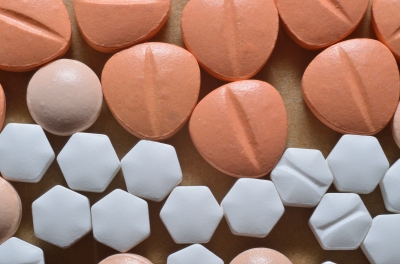Are Over The Counter Drugs Safe? Surprising Side Effects and Safer Alternatives

Medications and health products that can be purchased over-the-counter (OTC) at a pharmacy are assumed to be safe, but these products do carry the risk of side effects and health risks, especially when not used as recommended. The Drug Abuse Warning Network estimates that of the 2.1 million drug abuse emergency room visits, 27.1 percent involved nonmedical use of pharmaceuticals including prescription or OTC medications, and dietary supplements. Many people believe since these products are “over-the-counter,” that makes them safe.
That is not necessarily the case. Many OTC products have potential health risks, including side effects that impact heart health.
Sherry Torkos award winning pharmacist and author of Saving Women’s Hearts, has identified some of the most commonly used OTC product categories, some surprising side effects associated with these drugs, and smart alternatives to stay safe
1. Analgesics : Pain and discomfort from lifting, exercising, leg cramps and everyday life are often treated with over-the-counter analgesics such as aspirin, acetaminophen and ibuprofen. Up to 70 percent of the population in Western countries use analgesics regularly, primarily for muscle and joint pain. These drugs, while safe for some, can cause serious side effects, such as liver and kidney damage, ringing in the ears, stomach bleeding, rebound headaches, and increased risk of heart attack and stroke. Safer alternatives include curcumin and products that contain BioCell collagen. Curcumin helps reduce inflammation. BioCell collagen is a clinically studied form of collagen that helps to improve joint health and mobility. It is unique from other collagen products in that it is easily absorbed and gets to the target area. BioCell collagen is also great for the skin and has been shown to improve hydration and reduce wrinkles and fine lines.
2. Decongestants: These drugs are used to relieve congestion due to colds, allergies and sinus/ear pressure when flying. OTC decongestants carry the risk of serious side effects such as racing heart, increased blood pressure, insomnia, thinning of the delicate nasal lining, and worsening of health problems such as glaucoma and prostate disease. A safer way to relieve congestion is to use a nasal wash (neti pot) with essential oils such as eucalyptus to dissolve mucus and moisturize nasal passages. To relieve sinus congestion when flying swallow frequently, chew gum or suck on hard candy and try yawning big. Swallowing or yawning opens the eustachian tube and allows air to flow into or out of the middle ear, keeping the air pressure on both sides of the eardrum equal.
Continue reading
Lower Cholesterol – Is grapefruit juice safe with medications, such as Lipitor?
 Here’s another question I asked Dr. Cynthia Shelby-Lane and her answer.
Here’s another question I asked Dr. Cynthia Shelby-Lane and her answer.
Lisa Nelson RD: Is it safe for individuals taking medication for heart disease, such as Lipitor, to eat grapefruit or drink grapefruit juice?
Dr. Shelby-Lane: I am including information that may help answer your question about grapefruit and a variety of nutritionals that affect statin drugs for the lowering of cholesterol.
Zocor (Simvastatin), for example, is a Statin drug, used to lower high cholesterol levels, and also known as HMG-CoA reductase inhibitor. Zocor may affect the absorption or utilization of vitamins E and coenzyme Q10. Tests showed the average concentration of coenzyme Q10 in blood plasma decreased by approximately 50% after statins were used for 30 days. Supplementation is considered beneficial.
Grapefruit and grapefruit juice may increase the effects of HMG-CoA reductase inhibitors and should not be consumed at the same time. It is suggested that these medications be taken with water. Grapefruit contains substances that may inhibit the body’s ability to break down statin drugs increasing the toxicity of the drug. Muscle pain, tenderness, or muscle weakness may be a result. If you begin to notice these symptoms, contact your doctor.
Niacin is the form of vitamin B3 used to lower cholesterol. Large amounts of niacin taken with a statin drug may cause serious muscle disorders (myopathy). Reasonable levels of niacin combined with statin drugs have been shown to enhance the cholesterol lowering effect. For proper dosage, consult your physician before taking niacin.
Pomegranate juice has been shown to inhibit the same enzyme inhibited by grapefruit juice. This may cause reactions similar to grapefruit juice when it is used with statin drug treatments.
A study of 37 people with high cholesterol treated with diet and statin drugs found vitamin A increased in the blood over two years of therapy. People taking statin drugs and vitamin A supplements should have blood levels of vitamin A monitored.
Magnesium and aluminum containing antacids were reported to interfere with statin drug absorption. To avoid this interaction, take statin drugs two hours before or after any aluminum/magnesium containing antacids. Some magnesium supplements such as magnesium hydroxide are also antacids.
It should be noted that doctors often recommend supplementing with 100 mg of coenzyme Q10 per day for maintaining healthy levels. However, those on statin drugs may have a greater need for a higher dose. It further should be noted that the symptoms associated with the combination of grapefruit juice and statin drugs (muscle weakness and discomfort) are commonly reported as symptoms associated with CoQ10 depletions. Supplementation with coenzyme Q10 is strongly recommended.
The herbs Artichoke plant, Garlic and Plantain may decrease blood cholesterol levels, and therefore enhance the effects of Zocor. Consult with your pharmacist or physician before taking them.
All the best,
Lisa Nelson RD
Be Heart Healthy and Lose Weight



